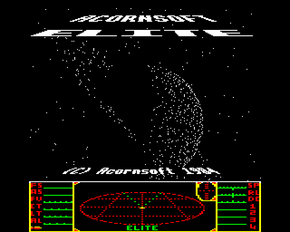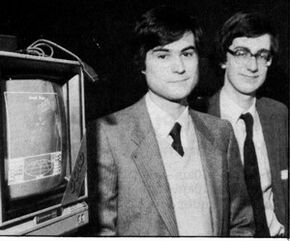Difference between revisions of "Classic Elite"
Cholmondely (talk | contribs) m (Formatting bullet points fixed on my Applemac. But now worried how it looks on other screens!) |
Cholmondely (talk | contribs) (More format tweaking & a little detail on nonBBC versions.) |
||
| Line 14: | Line 14: | ||
[[Image:BrabenBell.jpg|thumb|left|290px|Elite's creators at the time of launch in 1984: the youngsters David Braben and Ian Bell]] | [[Image:BrabenBell.jpg|thumb|left|290px|Elite's creators at the time of launch in 1984: the youngsters David Braben and Ian Bell]] | ||
| + | |||
| + | __NOTOC__ | ||
[http://en.wikipedia.org/wiki/Elite_%28computer_game%29 Elite] is a seminal space trading computer game, originally published by [http://en.wikipedia.org/wiki/Acornsoft Acornsoft] in 1984 for the [[BBC Micro]] and [[Acorn Electron]] computers and subsequently ported to many others. The game's title derives from one of the player's goals to raise their [[Elite Rankings|combat rating]] from Harmless, through Mostly Harmless, Poor, Average, Above Average, Competent, Dangerous, Deadly, before reaching the exalted heights of Elite. | [http://en.wikipedia.org/wiki/Elite_%28computer_game%29 Elite] is a seminal space trading computer game, originally published by [http://en.wikipedia.org/wiki/Acornsoft Acornsoft] in 1984 for the [[BBC Micro]] and [[Acorn Electron]] computers and subsequently ported to many others. The game's title derives from one of the player's goals to raise their [[Elite Rankings|combat rating]] from Harmless, through Mostly Harmless, Poor, Average, Above Average, Competent, Dangerous, Deadly, before reaching the exalted heights of Elite. | ||
| Line 28: | Line 30: | ||
</blockquote> | </blockquote> | ||
The player initially controls "Commander Jameson" and starts at the Lave orbital space station with 100 credits and a lightly armed Cobra Mark III. Most of the ships that the player encounters are named after snakes or other reptiles. Credits can be accumulated through piracy, trade, military missions, bounty hunting and asteroid mining. This money allows the player to upgrade the ship with improved weapons, a larger cargo hold, an automated docking system, an extra energy bank and more. | The player initially controls "Commander Jameson" and starts at the Lave orbital space station with 100 credits and a lightly armed Cobra Mark III. Most of the ships that the player encounters are named after snakes or other reptiles. Credits can be accumulated through piracy, trade, military missions, bounty hunting and asteroid mining. This money allows the player to upgrade the ship with improved weapons, a larger cargo hold, an automated docking system, an extra energy bank and more. | ||
| + | |||
| + | The later non-BBC ports of the game variously added new ships, more colour, replaced Dark Wheel with [[Imprint]], ''etc''. | ||
== The authors == | == The authors == | ||
Revision as of 08:55, 27 December 2020
| Elite | |
|---|---|

| |
| Developer | Ian Bell David Braben |
| Publisher | Acornsoft Firebird Torus Microprose Telecomsoft Hybrid |
| Latest version | Elite Elite Plus ArcElite |
| Release date(s) | 1984 |
| Platform(s) | BBC Micro Acorn Electron Commodore 64 Sinclair ZX Spectrum Amstrad CPC Apple ][ IBM PC Atari ST Amiga MSX Tatung Einstein NES Acorn Archimedes |
Elite is a seminal space trading computer game, originally published by Acornsoft in 1984 for the BBC Micro and Acorn Electron computers and subsequently ported to many others. The game's title derives from one of the player's goals to raise their combat rating from Harmless, through Mostly Harmless, Poor, Average, Above Average, Competent, Dangerous, Deadly, before reaching the exalted heights of Elite.
The BBC version of the game originally came on cassette in a box - this is a photograph of the front and back. The box contained:
- the cassette with the game on it
- instructions on loading the game
- a strip of card to place above the red function keys on the BBC Micro explaining their role in game (Launch/Buy Cargo/Equip Ship/Long range chart etc)
- a wall chart for identifying ships
- The Space Traders Flight Training Manual.
- a copy of The Dark Wheel novella
- a postcard for posting back to Acornsoft when one reached Elite status, so that they could send one a special badge!
The player initially controls "Commander Jameson" and starts at the Lave orbital space station with 100 credits and a lightly armed Cobra Mark III. Most of the ships that the player encounters are named after snakes or other reptiles. Credits can be accumulated through piracy, trade, military missions, bounty hunting and asteroid mining. This money allows the player to upgrade the ship with improved weapons, a larger cargo hold, an automated docking system, an extra energy bank and more.
The later non-BBC ports of the game variously added new ships, more colour, replaced Dark Wheel with Imprint, etc.
The authors
For the time (1983) it was relatively unusual to have more than one author for a game, but David Braben and Ian Bell realized they were working on similar projects and collaborated whilst undergraduates at the University of Cambridge to produce Elite.
There are two excellent stories of the original elite: the first concerns how the enterprising duo were able to cram the game into 32k of memory. The second concerns their difficulties in finding a publisher for it.
See how David Braben and Ian Bell created Elite, by watching the documentary Brits Who Made The Modern World.
See also
- Classic Elite ships
- Classic Elite ships firepower
- Classic Elite ships wireframe
- Classic Elite sounds
- Classic Elite entity states
- Classic Elite planet descriptions
- Legends of Elite
- Lore - debates over what the original Elite really was (was the novel really compatible with the game?).
- Vanilla game - the original Strict Game choice in the earlier versions of Oolite was an Elite emulator.
- Elite stories
Links
Elite sites
Most of the various Elite sites have foundered over the decades. These still worked in 2020.
- Ian Bell's site
- Acornarcade
- Frontierastro - also good for Frontier
- the original game code
- The Holy Scripture of Elite
History of Elite sites
An academic stab at a history of the development of Elite by Dr Alison Gazzard of UCL
Article by Matt Barton & Bill Loguidice (Design).
- Part of the book by Thomas Spufford who did the TV show on the making of Elite



